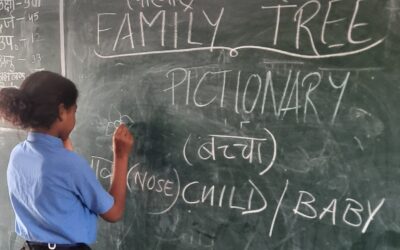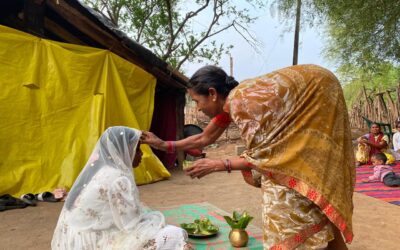Baldev Sharma’s* shop where you’ll find idols of gods and goddesses belonging to Hindu, Jain and Buddhist faiths, most of which have been carved on order by customers for various temples and homes.
Hailing from a lineage of sculptors, Sharma ji, almost on cue, begins to candidly talk about his dadas (grandfathers) and par-dadas (great grandfathers). “I come from a family of painters and sculptors,” he says. However, at the ripe age of 10, he decided to leave his home in Rajasthan, and move to the city of dreams, Mumbai. From his humble beginnings as a majdoor, who lifted and transported slabs of marble to finally owning a shop of his own, he’s come a long way.
Taking immense pride in his collection of handmade idols, he shows us around. As these unpainted statues gaze over us, Sharma ji laments how these days his shop, rather a metaphor for his entire business, has been wearing a deserted look, bereft of orders for idols due to COVID-19 pandemic, and the economic crisis it brought along.

Many of these statues, made from the much sought after stone in Rajasthan, would’ve otherwise found their homes by now. Instead, they lie here, gathering dust. While many god-makers experiment with an eclectic range of mediums — think cast bronze, carved wood, and even fired clay — no material has captivated quite like marble, Sharma Ji tells us.
Despite opening his shop early and closing it late, in the hopes of attracting new customers, there has been no sale whatsoever. Since the lockdown, production has stopped completely, he informs us. Huge unsold inventory has piled up, he adds. Into the business now for almost 20 years, religious marble statues, unlike other goods, are not sold in a time-bound manner. Often, a statue takes over a year to procure the marble block, transport it, carve and deliver to the customer.
Made from white marble, or Makrana marble, procured from the city of Makrana, Rajasthan, the statues carved out of this marble are known for exhibiting a distinctive shimmer and gloss — making them the most preferred choice for religious idols. Once the marble is obtained, Sharma Ji’s team of skilled artisans and craftspeople then work on these blocks for days to months, showcasing their talents through intricate carving. What’s left are statues with an unprecedented interest in naturalistic representation.
His murtikars, Sharma Ji tells us, skillfully sculpt beautiful figures that exhibit astonishing attention to detail, idealized perception of anatomy, and refined chiseling techniques — displaying the best of their kaarigari, making these marble stone sculptures more expensive than other forms of stone. Besides, marble also has a lower tensile strength and is vulnerable to cracking when extended poses are attempted, thereby justifying their exorbitant pricing.
Upon completion, these statues would then be transported to his shop in Mumbai’s Goregaon. Here, he pauses to stress on the fact how they are extremely heavy, and how transporting them is a tad bit difficult, but “hum sambhal lete hai”, he says. It is however, at his own shop in Goregaon where he and his son bring these idols to life with their mastery in paint and colours. Think bright gold and silver accents!
“Yeh corona ke pehle hum kabhi kabhi mahine mai 5-6 lakh kamate the. Usme se 50-60%, marble ki khareedi aur transport, murtikaaro ko unke labour ke liye, chala jata tha. Baaki ki kamayi se hum humara ghar chalate the. Lekin abhi dhanda thapp padh gaya hai,” he says, while talking of the impact of pandemic on his business. “Dukaan mai kamayi nahi ho rahi hai, lekin mahine ka ₹30,000 bhada dena padta hai. Iske upar aur bhi kharche hote hai. Kaise kaise karke chala rahe hai, upar wale ki meherbaani se,” he adds.
Thanks to his savings, Sharma ji has been making ends meet. However, what saddens him is the fact that he hasn’t been able to do much for his murtikaars back in Jaipur, Rajasthan. “Bas, ab hum sabhi bhagwaan ke bharose jee rahe hai. Yaha tak pahuch gaye hai, toh aage bhi chale jaenge,” he remarks.
Despite problems, the collective mood at Sharma ji’s dukaan is still upbeat. Looking at his courageous spirit with optimism and perseverance, I’m reminded of Louise Shropshire’s famous song that we can still sing, “We shall overcome”.

While this unpredictable and deadly virus has taken us captive and significantly affected our everyday lives, Sharma ji thinks that the pandemic has also compelled millions of people to turn to God for seeking solace and salvation. He says that COVID-19 has uncannily uprooted the belief that we don’t need God. He is hopeful that more people will sooner or later realize that the solution lies in reinvigorating faith.
Today as Sharma ji patiently waits to reunite a murti with its rightful owner, he looks forward to a bright future — not only one of creating a new normal for retail but also, one where he’s able to expand his business. For now, he spends his days teaching his son the nitty-gritty of the business, preparing him to take over soon, so that he could finally retire!
*Name and pictures used with consent




0 Comments